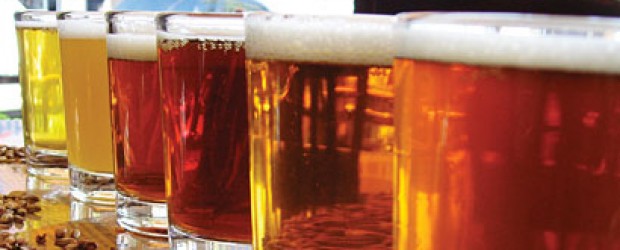I’ve recently figured out that my small bar refrigerator at the lowest setting will hold 2 – 3 gallon better bottles and will keep their temperature at about 44 degrees Fahrenheit. So now it’s time to start brewing some lagers! Both of these guys are either direct copies or very near copies of Jamil’s Brewing Classic Styles recipes. Here’s hoping the new 2.5 gallon kettle and mash tun scenario works out!
Brew day was November 21, 2012
Everything went very well. It was much easier working stovetop in the kitchen rather than working outside. The small batches went almost exactly as planned. The Munich Dunkel finished at around 1.059 and slightly low in volume. I decided to leave it rather than dilute it. The bock finished at 1.069ish. PH, Mash Temperature, cooling and boil all were fine. I pitched the Dunkel after a few hours in the refrigerator and waited until morning to pitch the bock. I pitched an active 1 liter starter in the bock. I think these two beers will end up great.
I don’t have the recipes up here at the moment. I used my new Brew Tablet software on this particular round of brewing. Due to not having a “recipe export” feature completed yet I’m not able to post them here yet. However I will be getting that done in the next month so I can continue posting the recipes I use here.
Notes From Bock Recipe:
Single infusion mash at 155F. Mash with 10 quarts of acidified prepared water. Sparge with 8 quarts of acidified water. Water Salts Used: 1.4 grams of chalk, 0.25 grams Gypsum, .5 grams calcium chloride. 1 ml of lactic acid on the mash and 1 ml lactic acid on the sparge should adjust the ph. This is an adaptation of a Munich water profile.
Notes From Dunkel Recipe:
Mash at 154F single infusion. 8 quarts of acidified mash water needed. 6 quarts of acidified sparge water needed. Treat 10 quarts of mash water and 8 quarts of sparge water to be safe on amounts. Water Salts Used: 1.4 grams of chalk, 0.25 grams Gypsum, .5 grams calcium chloride. .8 ml of lactic acid on the mash and .8 ml lactic acid on the sparge should adjust the ph. This is an adaptation of a Munich water profile.
Notes at Fermentation after 10 days of fermentation.:
The beer seemed to take off immediately but it was slow at first. There was immediate krausening and it was obvious activity was happening. After 6 days I took a reading and it was about 30% done. At 10 days there’s a lot of movement in the fermenter. The yeast is doing very well now. Interesting enough the WLP833 yeast is rocking despite being below it’s optimum temperature. The liquid temperature is in the mid 40’s. I decided to try this from what I heard from the head brewer at Karbach who spoke at the Dixie Cup. The bock tastes nice so at this point I think it’s a good suggestion.
Notes at Fermentation after 14 days of fermentation:
The dunkel is at 1.013 and appears completely done fermenting and the bock is at 1.018 with some yeast still left in suspension. Both are at desired terminal gravity and taste great so I’m dropping the temperature on them to cold crash. So far pretty darn good on first attempt in this new brewing configuration.
Tasting Notes on Dunkel at 32 days
The nose is right on as it smells like cocoa, fudge type character. The taste is good but at first astringent. A light astringency but it’s indeed there. I believe it should age out after 1 month of lagering.
Tasting Notes on Dunkel and Bock at 42 Days
I just got around to racking the bock to a keg and was a little worried about it. However it looks beautiful and tastes absolutely wonderful even flat. I hope not a thing changes! The astringency in the dunkel is gone and it tastes like German bakers chocolate to me. Zero head retention though. Both should be very good beers.
